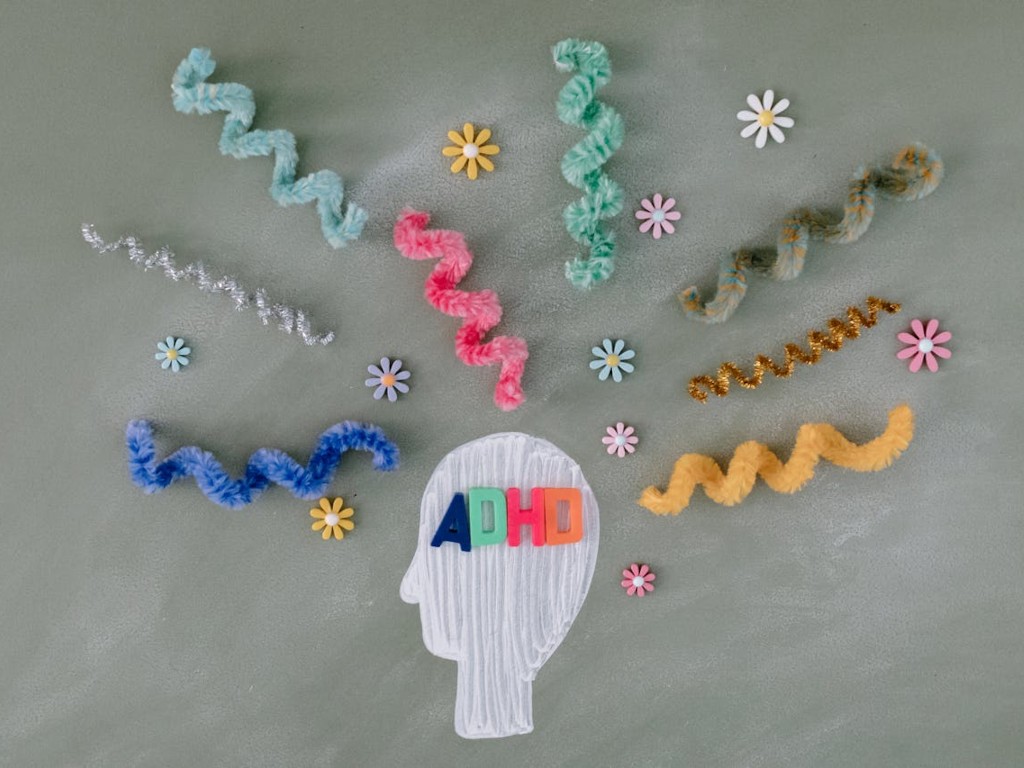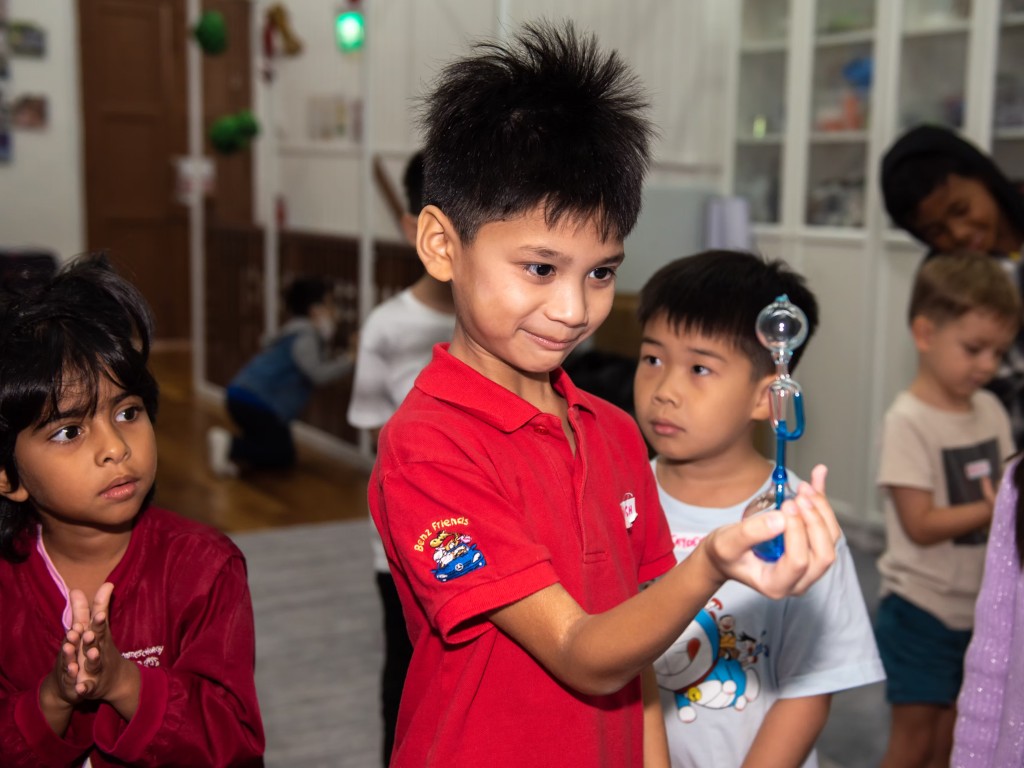SingaporeMotherhood | Parenting
February 2025
Understanding ADHD Kids: Dispelling Misconceptions with the Facts

Approximately five per cent of school-aged children are diagnosed with Attention-Deficit/Hyperactivity Disorder (ADHD). But what is it, really? Many people don’t believe that it’s a real condition. Others think that it’s normal for kids to be ‘hyper’ and that they’ll grow out of it. As parents, it’s easier to believe that our little monkeys aren’t performing at school because they’re too playful. But what if… they just can’t help themselves?
It’s time we learnt the facts surrounding ADHD. But to do that, let’s first look at some common misconceptions. How many of these did you believe?
5 Common Misconceptions Surrounding ADHD Kids
#1: ADHD is just a lack of discipline or poor parenting
This is one of the most harmful myths. ADHD is a neurodevelopmental disorder. It is not caused by bad parenting or a child simply being undisciplined. Children with ADHD struggle with symptoms despite their best efforts, and they require support, not punishment.
#2: ADHD means hyperactivity
While hyperactivity is one of the symptoms of ADHD, it is not the defining feature for everyone with the condition. In fact, many children may not display hyperactive behaviours. Instead, they may struggle more with focusing, organisation, and task completion.
#3: ADHD is overdiagnosed and not a real condition
ADHD is a real condition that impacts a person’s ability to function effectively in multiple areas of life, including school, work, and relationships. Rather than being overdiagnosed, the growing recognition of ADHD helps more children and adults receive appropriate support.
#4: ADHD kids are just lazy or playful
This common misconception often leads to feelings of shame for children with ADHD. Yet the reality is that ADHD affects the brain’s ability to focus. It may seem like they are not trying, but in fact, they often put in much more effort than their peers just to complete the same tasks.
#5: ADHD only affects boys
While ADHD is diagnosed more frequently in boys, it affects girls too. However, girls with ADHD are more likely to have the inattentive type and be less disruptive in class. As a result, they may face a delay in diagnosis and, in some cases, be misunderstood or dismissed.
(See also: Autism Spectrum Disorder (ASD): A Condition that Remains Underdiagnosed in Girls and Women)
By addressing these misconceptions, Tan Su-Lynn, Principal Educational Psychologist at Promises Healthcare, hopes to create a more supportive environment for ADHD kids and encourage a more accurate and empathetic understanding of the condition. Proper education and awareness help reduce stigma, while allowing individuals with ADHD to receive the resources and support they need to succeed. So forget those myths and read on for the facts!
What is ADHD?

ADHD is a neurodevelopmental disorder that affects the brain’s ability to regulate attention, impulses, and behaviour. It is characterised by persistent patterns of inattention, hyperactivity, and impulsivity that interfere with functioning or development. There are three main types:
- Inattentive: Mostly symptoms of inattention, but not hyperactivity or impulsivity
- Hyperactive-impulsive: Mostly symptoms of hyperactivity and impulsivity, but not inattention
- Combined: Symptoms of both inattention, as well as hyperactivity and impulsivity
ADHD is a complex condition with varying symptoms and severity. It often requires a multifaceted approach to management, including behavioural therapy, medication, and lifestyle changes.
What causes ADHD?
The exact cause of ADHD is not fully understood, but it is certainly not due to a lack of discipline. However, it is believed to result from a combination of genetic, environmental, and neurological factors. Some possible factors include:
- ADHD tends to run in families, suggesting a strong genetic component. Specific genes related to neurotransmitter systems, such as dopamine, may be involved.
- Studies show differences in brain structure and activity in individuals with ADHD, particularly in areas involving attention, impulse control, and executive functions.
- Certain environmental factors during pregnancy and early childhood may increase the risk of developing ADHD. Examples include exposure to toxins, premature birth, or severe stress or trauma in early childhood.
(See also: Prenatal Tests and Scans to take when you are Pregnant)
What symptoms do ADHD kids display?
The symptoms of ADHD in children are often noticeable across different settings. For example, at home, school, or social situations. Again, they are generally grouped into two primary categories.
Signs of inattention:
- difficulty sustaining focus on tasks or play
- frequent careless mistakes in schoolwork
- trouble organising activities
- tendency to avoid tasks requiring prolonged mental effort
- frequently lose essential items
- easily distracted by external stimuli
- display forgetfulness in daily routines
Signs of hyperactivity-impulsivity:
- fidgeting
- difficulty remaining seated when expected
- running or climbing in inappropriate situations
- unable to play quietly
- talk excessively
- blurt out answers prematurely
- struggle to wait their turn
- interrupt or intrude on others’ conversations or activities
Such children often seem constantly ‘on the go’ or act as if ‘driven by a motor’.
At what age do symptoms usually manifest?

ADHD symptoms typically manifest before the age of 12. In many cases, signs of hyperactivity and impulsivity can be noticeable as early as 3 to 6 years of age. Whereas issues with inattention may become more apparent after the child starts school, where demands for sustained focus and organised tasks increase.
However, high-functioning ADHD kids often mask their symptoms through intelligence and coping strategies, making early diagnosis challenging. They may struggle with inattention, frequently forget instructions, lose track of assignments, or make careless mistakes despite strong cognitive abilities.
While they can hyperfocus on special interests, they may procrastinate, have difficulty with organisation, and struggle with time management. Executive functioning challenges, such as poor working memory and difficulty transitioning between tasks, further impact their daily life.
Because these high-functioning ADHD kids may typically appear well-behaved or academically capable, their symptoms are often overlooked. This leads to delayed identification and support.
(See also: Building Bridges: The Key to Thriving Parent-Teacher Partnerships & Primary One Transition)
Do boys and girls with ADHD present differently?
Boys are more likely to exhibit hyperactive and impulsive behaviours, such as fidgeting, interrupting, and constantly being on the move. They also tend to display externalising behaviours that are more disruptive. Because these are more noticeable, particularly in classroom settings, it leads to earlier and more frequent diagnoses.
In contrast, girls are more likely to exhibit inattentive symptoms, such as daydreaming, being easily distracted, and struggling to focus on tasks. They may also show internalising behaviours, like being withdrawn or overly quiet, which are less disruptive and harder to detect. As a result, girls are often diagnosed later than boys, sometimes not until adolescence or adulthood.
These gender-based differences can contribute to the underdiagnosis or misdiagnosis of ADHD in girls. Thus, it is essential to recognise these variations to ensure accurate diagnoses and appropriate support for both girls and boys.
Most children are naturally active and easily distracted. How can we tell the difference?
Parents can differentiate ADHD from typical childhood behaviour by looking at consistency, severity, and impact on daily life. While most children can be active or distracted, kids with ADHD display these behaviours more frequently, intensely, and persistently across different settings (home, school, and social situations).
Their inattention, impulsivity, or hyperactivity significantly disrupt daily tasks, relationships, and learning. Unlike typical kids who can focus when needed, children with ADHD may not be able to, however hard they try. They often struggle with sustained attention, organisation, and impulse control, even when motivated.
If these challenges persist for six months or more and interfere with their development, an ADHD evaluation may be necessary.
What should parents do if they suspect their child has ADHD?

Firstly, I want to reassure parents that recognising potential ADHD symptoms is an important step, and it is great that you are paying attention to your child’s needs. ADHD is a neurodevelopmental condition, not a result of bad parenting, and early identification can make a significant difference in a child’s success and well-being.
The next step is to observe and document behaviours over time. ADHD symptoms should be present in multiple settings, like home, school, and social situations. Take note of specific challenges, patterns, and even strengths, as this information will be helpful during a professional assessment.
Another important step is to communicate with teachers. They spend lots of time with your child, so they can provide valuable insight into their attention, impulse control, and academic challenges. I recommend parents reach out to teachers to discuss any concerns and gather feedback. Teachers may also have strategies or observations that help clarify whether ADHD could be a factor.
While there is a lot of information available online, I caution parents against self-diagnosing. It is natural to look for answers, but ADHD should always be diagnosed by a qualified professional. Consult a paediatrician, psychiatrist, or an educational or clinical psychologist.
Getting an accurate diagnosis ensures the child receives the right kind of support, whether through behavioural strategies, school accommodations, or in some cases, medication. With the right understanding and support, children with ADHD can thrive in school, social settings, and everyday life.
(See also: Social Anxiety Disorder: Not Shy, Not an Introvert, Not Rude, just Overwhelming Fear in Social Settings)
How are ADHD kids diagnosed?
There is no single test that can confirm ADHD, so it requires a comprehensive evaluation. A combination of clinical interviews, behavioural assessments, and standardised rating scales are typically used to determine whether a child meets the criteria outlined in the DSM-5 (Diagnostic and Statistical Manual of Mental Disorders, 5th Edition).
Parents and teachers play a key role in this process, as their observations provide insight into how the child behaves across different environments. Hence, one of the first steps in diagnosis is conducting clinical interviews with parents, teachers, and sometimes the child.
Behavioural rating scales are used to assess symptoms of inattention, hyperactivity, and impulsivity. In some cases, direct observation of the child in a structured setting may be helpful.
Can a misdiagnosis happen?
Misdiagnoses can indeed happen, both in the form of overdiagnosis and underdiagnosis.
Overdiagnosis may occur when typical childhood behaviours, such as high energy or occasional forgetfulness, are mistaken for ADHD. This is more likely if the evaluation relies too heavily on subjective reports without a thorough assessment.
On the other hand, underdiagnosis is also common, particularly in girls and high-functioning children, whose symptoms may be more subtle and less disruptive, leading them to be overlooked.
A proper evaluation is essential because many factors, including anxiety and learning differences, can sometimes mimic ADHD symptoms. Additionally, it is important to rule out other conditions, as ADHD symptoms can overlap with learning disabilities, autism, and even sleep disorders.
Because ADHD shares similarities with other conditions, an accurate diagnosis requires a careful, multi-step approach. Proper diagnosis is essential for ensuring that a child receives the right support and interventions.
How is ADHD in children managed?

The good news is that ADHD is highly manageable, and early intervention leads to better outcomes. The most common methods include:
Behavioural Therapy: This involves teaching children and their families strategies to manage ADHD symptoms. Techniques may include positive reinforcement, structured routines, and breaking tasks into smaller, manageable steps. Parents and teachers may also receive training to support the child effectively.
Medication: Stimulant medications, such as methylphenidate or amphetamines, are often prescribed to help improve focus, attention, and self-control. Non-stimulant medications may also be used if stimulants are ineffective or cause side effects.
Educational Support: ADHD kids often benefit from accommodations in school, such as additional time for tasks, a quiet workspace, or individualised education plans (IEPs) tailored to their learning needs.
Counselling or Psychotherapy: Therapy can help children develop emotional regulation, social skills, and coping mechanisms. Counselling may also address any co-existing conditions, such as anxiety or depression.
Lifestyle Adjustments: Regular exercise, a consistent sleep schedule, and a balanced diet can help improve focus and mood. Teaching children self-regulation strategies, such as using planners, timers, and mindfulness techniques, can also help them build independence and confidence.
Since every child with ADHD is unique, support plans should be tailored to their specific strengths and challenges. Working closely with teachers, therapists, and qualified professionals ensures that children receive the right support to thrive.
What can parents of ADHD kids do — and not do?
If your child is diagnosed with ADHD, it’s essential to educate yourself about the condition, work closely with professionals, and establish clear routines to help your child thrive.
- First and foremost, don’t ignore the diagnosis or delay seeking treatment, because early intervention is crucial.
- Focus on using positive reinforcement to build their confidence, and ensure tasks are manageable to avoid overwhelming them.
- Communicate regularly with teachers to ensure they receive the necessary accommodations at school. At home, encourage healthy habits like exercise, proper nutrition, and adequate sleep.
- Patience is key. It’s also important not to expect immediate results — managing ADHD is a long-term process. It can take time to find the right combination of strategies and treatments.
- Avoid blaming or shaming your child for behaviours they may not be able to control. And steer clear of comparisons with peers or siblings, as this can harm their self-esteem.
- Teaching your child to advocate for themselves is another important step. Encourage them to communicate their needs and seek support when necessary, which will help them build independence and confidence over time.
- Encourage social interactions and provide opportunities for them to build relationships with peers. Social skills training may also be helpful, as isolation can negatively affect self-esteem.
By understanding ADHD and providing the right support, you can help your child manage their symptoms, build resilience, and thrive in different areas of life. ADHD is just one aspect of who your child is, and with the right strategies, they can achieve their full potential.
How does ADHD affect children’s development?
Children with ADHD may experience delayed development in areas such as impulse control, emotional regulation, and social skills.
For example, they might struggle to control their emotions in frustrating situations. These challenges can affect their self-esteem and sense of confidence. However, with appropriate interventions like therapy and behaviour management strategies, children can develop stronger coping mechanisms and improve their emotional regulation over time.
Socially, ADHD kids may find it difficult to make and maintain friendships due to impulsivity or inattentiveness during conversations. They might interrupt others or struggle to follow social cues. But with targeted social skills training, role-playing exercises, and lots of encouragement, they can improve their interactions and form meaningful relationships.
Will ADHD affect children academically?

In an academic setting, children may struggle with paying attention, staying organised, following multi-step instructions, and completing tasks on time. These difficulties can lead to academic underachievement, even though they may have the ability to perform well.
With the right academic support and access accommodations, such as extended examination time or separate exam venue with reduced distractions, ADHD kids can succeed in school, especially when their learning styles are considered.
It is not uncommon for children with ADHD to be labelled as lazy or careless, but these struggles are typically a result of the condition itself rather than a lack of effort.
Similarly, ADHD can affect daily home routines, including organisation, time management, and task completion. Children may forget important activities, lose things frequently, or struggle to keep up with chores and personal responsibilities.
These challenges can create frustration for both the child and their parents. However, with structured routines, checklists, and consistent reminders, ADHD kids can develop organisational skills and improve their time management.
(See also: Decoding Parent-Child Dynamics: Mummy Evelyn & Daughter Claire)
Can children outgrow ADHD?
In early childhood, ADHD symptoms often manifest as hyperactivity and impulsivity, which can be more noticeable and disruptive. As children get older, these symptoms may become less overt, and the focus may shift more toward inattention or difficulty with organisation and time management.
Some children may learn coping strategies and develop better self-regulation skills, especially with appropriate interventions like therapy, behaviour management, and medication. However, ADHD tends to persist into adolescence and adulthood, and is generally considered a lifelong condition.
For some individuals, the challenges of ADHD may evolve. Impulsivity and hyperactivity may become less of an issue, but the struggles with attention, focus, and executive functioning often remain. Many adults with ADHD find ways to manage their symptoms effectively through strategies, therapy and/or medication.
It is important to approach ADHD with the understanding that while it may not be ‘outgrown’, early diagnosis and consistent intervention can help your child develop the necessary tools to manage their symptoms and lead a successful and fulfilling life. Working with healthcare professionals, teachers, and support systems can help guide your child through the challenges of ADHD while maximising their strengths.
Are YOU struggling with your ADHD child?

Always remember these three things:
Nobody’s journey is the same
It can be so easy to compare our children to other people’s kids. You might see your child’s best friend reading books, while your child is still trying to learn letters. Just remember, your child’s development and progress might be different and that is okay.
Be patient and compassionate with yourself and your child. ADHD can bring challenges, but it also comes with strengths, such as creativity, energy, and the ability to think outside the box.
There is nothing wrong with you
We see so many families blame themselves for their child’s challenges. You may begin to wonder if you did something ‘wrong’ in your parenting. Please know that you did not cause your child’s ADHD. It’s true that if you have ADHD, it is certainly possible that your child inherited this from you.
But understand that all our children will have strengths and challenges in life. And know how wonderful it is that you so intimately understand your child’s challenges and can advocate for their needs so early on in life. You can provide the support they need that maybe you didn’t have as a child.
Take care of your own well-being
This is super important. Parenting ADHD kids can be draining, and it’s okay to ask for support. You are not alone, and with time and support, both you and your child can find strategies that work.
 | Expert Resource Tan Su-Lynn is an educational psychologist with over a decade of experience working with children with special needs during her time at the MOE. Su-Lynn has done much work helping schools to identify and support children with special needs, and consults for schools and parents on learning and behavioural intervention strategies. |
Featured image: Tara Winstead on Pexels
All content from this article, including images, cannot be reproduced without credits or written permission from SingaporeMotherhood.
Follow us on Facebook, Instagram, and Telegram for the latest article and promotion updates.





